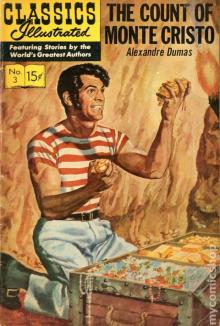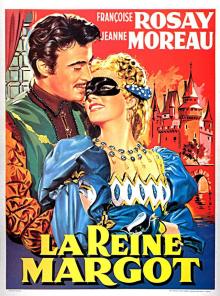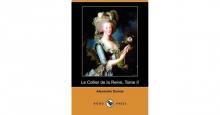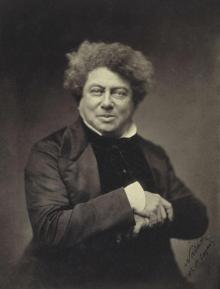- Home
- Alexandre Dumas
Une fille du régent. English Page 3
Une fille du régent. English Read online
Page 3
CHAPTER II.
DECIDEDLY THE FAMILY BEGINS TO SETTLE DOWN.
Whatever the regent might say, the Duchesse de Berry was his favoritedaughter. At seven years of age she had been seized with a disease whichall the doctors declared to be fatal, and when they had abandoned her,her father, who had studied medicine, took her in hand himself, andsucceeded in saving her.
From that time the regent's affection for his daughter became almost aweakness. He allowed the haughty and self-willed child the most perfectliberty; her education was neglected, but this did not prevent LouisXIV. from choosing her as a wife for his grandson the Duc de Berry.
It is well known how death at once struck a triple blow at the royalposterity, and within a few years carried off the dauphin, the Duc andDuchesse de Bourgoyne and the Duc de Berry.
Left a widow at twenty years of age, loving her father almost astenderly as he loved her, and having to choose between the society ofVersailles and that of the Palais Royal, the Duchesse de Berry, young,beautiful, and fond of pleasure, had quickly decided. She took part inall the fetes, the pleasures and follies of her father.
The Duc d'Orleans, in his increasing fondness for his daughter--whoalready had six hundred thousand francs a year--allowed her four hundredthousand francs more from his private fortune. He gave up the Luxembourgto her, gave her a bodyguard, and at length, to the scandal of those whoadvocated the old forms of etiquette, he merely shrugged his shoulderswhen the Duchesse de Berry passed through Paris preceded by cymbals andtrumpets, and only laughed when she received the Venetian ambassador ona throne, raised on three steps, which nearly embroiled France with therepublic of Venice.
About this time the Duchesse de Berry took a fancy to fall in love withthe Chevalier de Riom.
The Chevalier de Riom was a nephew or grand-nephew of the Duc de Lauzun,who came to Paris in 1715 to seek his fortune, and found it at theLuxembourg. Introduced to the princess by Madame de Mouchy, he soonestablished the same influence over her as his uncle, the Duc de Lauzun,had exercised over La Grande Mademoiselle fifty years before, and wassoon established as her lover, supplanting Lahaie, who was sent on anembassy to Denmark.
The duchess had the singular moderation of never having had more thantwo lovers; Lahaie, whom she had never avowed, and Riom, whom sheproclaimed aloud.
This was not the true cause of the malice with which the princess waspursued; it arose rather from the previous offenses of her passagethrough Paris, the reception of the ambassadors, her bodyguard, and herassumptions. The duke himself was indignant at Riom's influence over hisdaughter. Riom had been brought up by the Duc de Lauzun, who in themorning had crushed the hand of the Princesse de Monaco with the heel ofthe boot which, in the evening, he made the daughter of Gastond'Orleans pull off, and who had given his nephew the followinginstruction, which Riom had fully carried out.
"The daughters of France," said he, "must be treated with a high hand;"and Riom, trusting to his uncle's experience, had so well schooled theDuchesse de Berry that she scarcely dared to give a fete without hispermission.
The duke took as strong a dislike to Riom as his careless characterallowed him to take to any one, and, under pretext of serving theduchess, had given him a regiment, then the government of Cognac, thenthe order to retire to his government, which almost made his favors looklike disfavors and disgrace.
The duchess was not deceived; she went to her father, begged, prayed,and scolded, but in vain; and she went away threatening the duke withher anger, and declaring that Riom should not go.
The duke's only reply was to repeat his orders for Riom's departure thenext day, and Riom had respectfully promised to obey.
The same day, which was the one preceding that on which our story opens,Riom had ostensibly set out, and Dubois himself had told the duke thathe had left for Cognac at nine o'clock.
Meanwhile the duke had not again seen his daughter; thus, when he spokeof going to finish with her, it was rather a pardon than a quarrel thathe went to seek. Dubois had not been duped by this pretended resolution;but Riom was gone, and that was all he wanted; he hoped to slip in somenew personage who should efface all memory of Riom, who was to be sentto join the Marechal de Berwick in Spain.
The carriage stopped before the Luxembourg, which was lighted as usual.
The duke ascended the steps with his usual celerity, Dubois remained ina corner of the carriage. Presently the duke appeared at the door with adisappointed air.
"Ah, monseigneur," said Dubois, "are you refused admittance?"
"No, the duchesse is not here."
"Where, then--at the Carmelites?"
"No, at Meudon."
"At Meudon, in February, and in such weather; what can she be doingthere?"
"It is easy to know."
"How?"
"Let us go to Meudon."
"To Meudon!" said the regent, jumping into the carriage; "I allow youfive-and-twenty minutes to get there."
"I would humbly beg to remind monseigneur," said the coachman, "that thehorses have already gone ten leagues."
"Kill them, but be at Meudon in five-and-twenty minutes."
There was no reply to be made to such an order; the coachman whipped hishorses, and the noble animals set out at as brisk a pace as if they hadjust left the stable.
Throughout the drive Dubois was silent, and the regent thoughtful; therewas nothing on the route to arrest the attention of either, and theyarrived at Meudon full of contradictory reflections.
This time both alighted; Dubois, thinking the interview might be long,was anxious to find a more comfortable waiting-place than a carriage.
At the door they found a Swiss in full livery--he stopped them--the dukemade himself known.
"Pardon," said the Swiss, "I did not know that monseigneur wasexpected."
"Expected or not, I am here; send word to the princess."
"Monseigneur is to be at the ceremony?" asked the Swiss, who seemedembarrassed.
"Yes, of course," put in Dubois, stopping the duke, who was about to askwhat ceremony; "and I also."
"Then shall I lead monseigneur at once to the chapel?"
"To the chapel?" asked the duke.
"Yes; for the ceremony is already commenced."
"Ah, Dubois," said the duke, "is she also going to take the veil?"
"Monseigneur," said Dubois, "I should rather say she is going to bemarried."
"Pardieu!" exclaimed the regent, "that would crown all;" and he dartedtoward the staircase, followed by Dubois.
"Does not monseigneur wish me to guide him?" asked the Swiss.
"It is needless," cried the regent; "I know the way."
Indeed--with an agility surprising in so corpulent a man--the regentdarted through the rooms and corridors, and arrived at the door of thechapel, which appeared to be closed, but yielded to the first touch.Dubois was right.
Riom, who had returned secretly, was on his knees with the princess,before the private chaplain of the Luxembourg, while M. de Pons, Riom'srelative, and the Marquis de la Rochefoucauld, captain of the princess'sguard, held the canopy over their heads; Messrs. de Mouchy and de Lauzunstood, one by the duchess and the other by Riom.
"Certainly fortune is against us, monseigneur," said Dubois; "we arefive minutes too late."
"Mordieu!" cried the duke, exasperated, "we will see."
"Chut," said Dubois; "I cannot permit sacrilege. If it were any use, Ido not say; but this would be mere folly."
"Are they married, then?" asked the duke, drawing back.
"So much married, monseigneur, that the devil himself cannot unmarrythem, without the assistance of the pope."
"I will write to Rome!"
"Take care, monseigneur; do not waste your influence; you will want itall, so get me made a cardinal."
"But," exclaimed the regent, "such a marriage is intolerable."
"Mesalliances are in fashion," said Dubois; "there is nothing elsetalked of--Louis XIV. made a mesalliance in marrying Madame deMainteno
n, to whom you pay a pension as his widow--La GrandeMademoiselle made a mesalliance in marrying the Duc de Lauzun--you didso in marrying Mademoiselle de Blois, so much so, indeed, that when youannounced the marriage to your mother, the princess palatine, shereplied by a blow. Did not I do the same when I married the daughter ofa village schoolmaster? After such good examples, why should not yourdaughter do so in her turn?"
"Silence, demon," said the regent.
"Besides," continued Dubois, "the Duchesse de Berry's passion began tobe talked about, and this will quiet the talk; for it will be known allthrough Paris to-morrow. Decidedly, monseigneur, your family begins tosettle down."
The Duc d'Orleans uttered an oath, to which Dubois replied by a laugh,which Mephistopheles might have envied.
"Silence!" cried a Swiss, who did not know who it was that was making anoise, and did not wish the pious exhortation of the chaplain to belost.
"Silence, monseigneur," repeated Dubois; "you are disturbing theceremony."
"If we are not silent," replied the duke, "the next thing they will dowill be to turn us out."
"Silence!" repeated the Swiss, striking the flagstone with his halberd,while the Duchesse de Berry sent M. de Mouchy to learn who was causingthe disturbance.
M. de Mouchy obeyed the orders of the duchess, and perceiving twopersons who appeared to be concealing themselves in the shade, heapproached them.
"Who is making this noise?" said he; "and who gave you permission toenter this chapel?"
"One who has a great mind to send you all out by the window," repliedthe regent, "but who will content himself at present with begging you toorder M. de Riom to set out at once for Cognac, and to intimate to theDuchesse de Berry that she had better absent herself from the PalaisRoyal."
The regent went out, signing to Dubois to follow; and, leaving M. deMouchy bewildered at his appearance, returned to the Palais Royal.
That evening the regent wrote a letter, and ringing for a valet:
"Take care that this letter is dispatched by an express courierto-morrow morning, and is delivered only to the person to whom it isaddressed."
That person was Madame Ursule, Superior of the Ursuline Convent atClisson.

 The Count of Monte Cristo, Illustrated
The Count of Monte Cristo, Illustrated Knight of Maison-Rouge
Knight of Maison-Rouge![The Three Musketeers - Alexandre Dumas - [Full Version] - (ANNOTATED) Read online](http://i1.bookreadfree.com/14/the_three_musketeers_-_alexandre_dumas_-_[full_version]_-_annotated_preview.jpg) The Three Musketeers - Alexandre Dumas - [Full Version] - (ANNOTATED)
The Three Musketeers - Alexandre Dumas - [Full Version] - (ANNOTATED) The Man in the Iron Mask
The Man in the Iron Mask The Count of Monte Cristo (Penguin Classics eBook)
The Count of Monte Cristo (Penguin Classics eBook) Count of Monte Cristo (abridged) (Barnes & Noble Classics Series)
Count of Monte Cristo (abridged) (Barnes & Noble Classics Series) The Women's War
The Women's War La reine Margot. English
La reine Margot. English The Vicomte de Bragelonne
The Vicomte de Bragelonne__english_preview.jpg) La dame aux camélias (Novel). English
La dame aux camélias (Novel). English The Count of Monte Cristo
The Count of Monte Cristo Balsamo, the Magician; or, The Memoirs of a Physician
Balsamo, the Magician; or, The Memoirs of a Physician Ten Years Later
Ten Years Later The Romance of Violette
The Romance of Violette The Mesmerist's Victim
The Mesmerist's Victim Vingt ans après. English
Vingt ans après. English Le collier de la reine. English
Le collier de la reine. English Taking the Bastile; Or, Pitou the Peasant
Taking the Bastile; Or, Pitou the Peasant The Hero of the People: A Historical Romance of Love, Liberty and Loyalty
The Hero of the People: A Historical Romance of Love, Liberty and Loyalty Louise de la Valliere
Louise de la Valliere Les Quarante-cinq. English
Les Quarante-cinq. English Ange Pitou (Volume 1)
Ange Pitou (Volume 1) The Royal Life Guard; or, the flight of the royal family.
The Royal Life Guard; or, the flight of the royal family. Les trois mousquetaires. English
Les trois mousquetaires. English Une fille du régent. English
Une fille du régent. English The Knight of Maison-Rouge
The Knight of Maison-Rouge The Count of Monte Cristo (Unabridged Penguin)
The Count of Monte Cristo (Unabridged Penguin) Ange Pitou
Ange Pitou The Romance of Violette (vintage erotica)
The Romance of Violette (vintage erotica) The Three Musketeers
The Three Musketeers Three Musketeers (Barnes & Noble Classics Series)
Three Musketeers (Barnes & Noble Classics Series) Georges
Georges Man in the Iron Mask (Barnes & Noble Classics Series)
Man in the Iron Mask (Barnes & Noble Classics Series) The Red Sphinx
The Red Sphinx